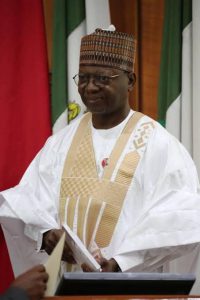It is unarguably true that social media is a platform that has given voice to the voiceless and has helped boost communication across the world.

It has also brought about citizen journalism where anyone and everyone can actively play a role in the process of collecting, reporting, analyzing, and disseminating news and information.
To a large extent, it has helped in restructuring communication and information.
The proposed social media bill in Nigeria
In 2019, news broke that the Senate were considering signing a bill that will regulate the use of social media in Nigeria.

The aim of the bill is to curb fake news but many believe the government intend to use it as propaganda to restrict the flow of information and prevent them from condemning the government.
The bill named ‘Protection from Internet Falsehood and Manipulations Bill, 2019’ is sponsored by Mohammed Sani Musa and it was read for the first time on Tuesday, November 5, 2019.
Mr Musa said the bill is for “patriotic Nigerians” who want to see the country live in peace.
The bill gives the government the power to shut down the internet at their own will.
An active supporter of the bill is Senator Elisha Abbo, who is currently being investigated for an alleged assault he carried out on a woman at a sex-toy shop in Abuja.

The senator was caught on a CCTV footage, slapping the woman repeatedly in July.
Senator Abbo supports the bill, perhaps because it is beneficial to him, but his reason is to prevent “fake news” from spreading to different countries.
According to him, fake news is “a cancer waiting to consume all of us.”
The penalties of the Social Media Bill if passed
Reading out the penalties, the sponsor of the Protection from Internet Falsehood and Manipulations Bill, also known as the Social Media Bill, Senator Mohammed Sani Musa said;
“If anyone is caught with this kind of situation, you cough out between N150,000 to a maximum imprisonment of three years or both.
And if it is a corporate organization that refused to block that false information despite the fact that they have been alerted by authorities not to disseminate that information for public interest and they still go-ahead to do it, refusing to do that blockage will be penalized between N5 million to N10 million for those organizations.”
However, despite the abundance of proofs about its existence, Nigeria’s minister of information, Lai Mohammed has said the country is not trying to pass a law that can stifle dissensions. “I’m not even aware of the bill,” Mohammed told DW’s Tim Sebastian in London. He doubled down on that claim moments later, noting that “there is no such bill before the House. I can say that with relative authority.”
Nigerians Reactions to the Social Media Bill
Speaking with Mr Joe Ejofor, the public relations officer in Yaba College Of Technology polytechnic on his view about the social media bill, he said;
“It is a gang up on people’s right. The bill violates a person’s fundamental right to freedom speech if he or she can’t air their opinion without any form of punishment. Coming out to ban social media and send people, who make comments behind their laptops, doesn’t depict a country that wants to grow.
“Notwithstanding, I believe there should be a way out. A lot of people have taken advantage of social media to invade people’s privacy. Even though I oppose the bill, those involved in the act should be penalized. There should be a balance in which people can talk without being penalised. A situation whereby people try to probe into people’s lives should be restricted.”
Another staff, who pleaded anonymity, in the institution, said; “The bill is anti-democratic. Even though the government have made their mistakes in the past, the bill shouldn’t be the next thing. Rather, there is an aspect of the government which needs urgent attention which is the obedience to the rule of law and separation of power”
Making reference to Sowore’s case, he said;
“This is a government that will tell you that the court will release a person but they will keep this person back for being a threat to national security. If the law is eventually passed, a person can be arrested and killed for God knows what. The bill isn’t necessary as there are already provisions of law that will take care of fake news.
“The bill is just a way to counter the Freedom of Information Act, FOI, bill signed into law. Goodluck Jonathan signed the law in 2015 despite several disputes.”
Supporting the proposed bill, Mr Peter, a lecturer in the institution stated; “I support the bill, everything in this world has pros and cons. The excesses of social media need to be curtailed because the damages are overshadowing the beauty.
“The bill is the only way to balance a problem and it can only work if guiding principles are put in place for instance; make the law in such a way that it is fair to the citizens. The aim of the bill must not be devalued.
“I am advocating that the government put everything in place to block loopholes that will affect the bill. Nigerians are only looking at their loss rather than focusing on the end result which is to curb fake news. We should learn to sacrifice. The rate at which fake news is becoming a norm in the country is becoming alarming. If you care about the country then you should be in support of this.
“The essence of social media is to involve, educate and entertain but when you disperse the wrong information for instance; the president himself, Muhammed Buhari got embroiled in a messy situation after reports claimed he was getting married to another woman.
” There was also a report alleging the president had died and he is being represented by his doppelganger. The man has been embarrassed within and outside the country. Just because he is being called “Baba Go Slow” doesn’t mean he doesn’t have feelings as well. Only the person wearing the shoe can tell where it pinches him or her.
“Some people have suffered because of this issue. Every law can be amended at any time, the government found out people are misusing the FOI law so they brought about a solution. Why can’t Nigerians just accept it as a sacrifice for their country? I do not believe the government intend to use it as a way to cover their sins, we still have our freedom of speech but we need to be careful.”
Countering the argument, Amokeodo Olabanji said;
“I’m totally against it, regulating social media would also mean you’re talking our fundamental human rights, that is right to communicate and expression and this will ultimately make the country a totalitarian start and we practice Democracy in Nigeria. The government should find other means of curbing fake news.”
Corroborating Amokeodo’s argument, Adedeji Adebgite said;
“First of all, freedom of speech and that includes what you type or put online, as long as it’s not to ruin anyone’s career and it’s true. Also, government officials should be able to be held accountable and when they fall short of that people should be allowed to express their concerns and reservations although things like death threats and all should not be taken lightly.”
In his opinion about the proposed bill, Damilola Ogunbanjo said;
“The idea is good to stop the false spread of information is good (e.g the death of Wole Soyinka; a man who receives calls almost yearly from family and friends to confirm if he’s still alive or dead will stop) but this is NIGERIA.
“Most of these good ideas become perverted and used to political agendas. People will be harassed indiscriminately. And there is a general fear that it will affect Freedom of speech. It is perceived that the president does not like people talking against him so he might use this opportunity to fine or jail people that talk against him”
A female political science student at Crawford University, Adeze Nnaji said;
“I feel that despite the fact that the government is painting this bill to make it look like it is to our benefit, it’s actually to our detriment. In a way, this bill is being an obstacle to the freedom of speech and opinion because we all know the elites and so-called government officials can manipulate any platform they want to.
“This bill might just be one more asset to make them stronger. Who decides what information is good for the public interest?
“Aren’t we smart enough to decide for ourselves what we choose to do with information? They can turn real information to a false and provoking one real quick under the guise of the penalty that this bill encompasses so left for me, it’s unnecessary. They should rather pass a bill on Cuber trolling, hate speeches and slander on social media instead.”




